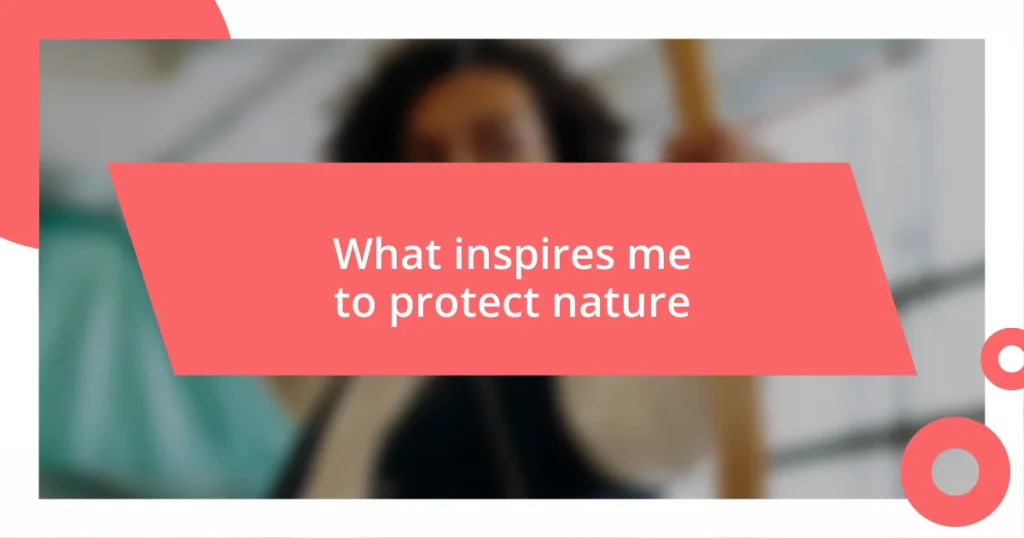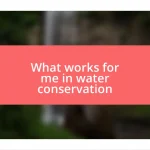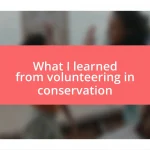Key takeaways:
- Nature conservation is essential for biodiversity, mental well-being, and social responsibility, impacting both the environment and human happiness.
- Personal experiences in nature—like peaceful moments by a lake, camping under a starry sky, and participating in community tree planting—ignite a sense of belonging and responsibility to protect our ecosystems.
- Community engagement amplifies conservation efforts through shared knowledge and collective actions, demonstrating the powerful impact of united conservation initiatives.
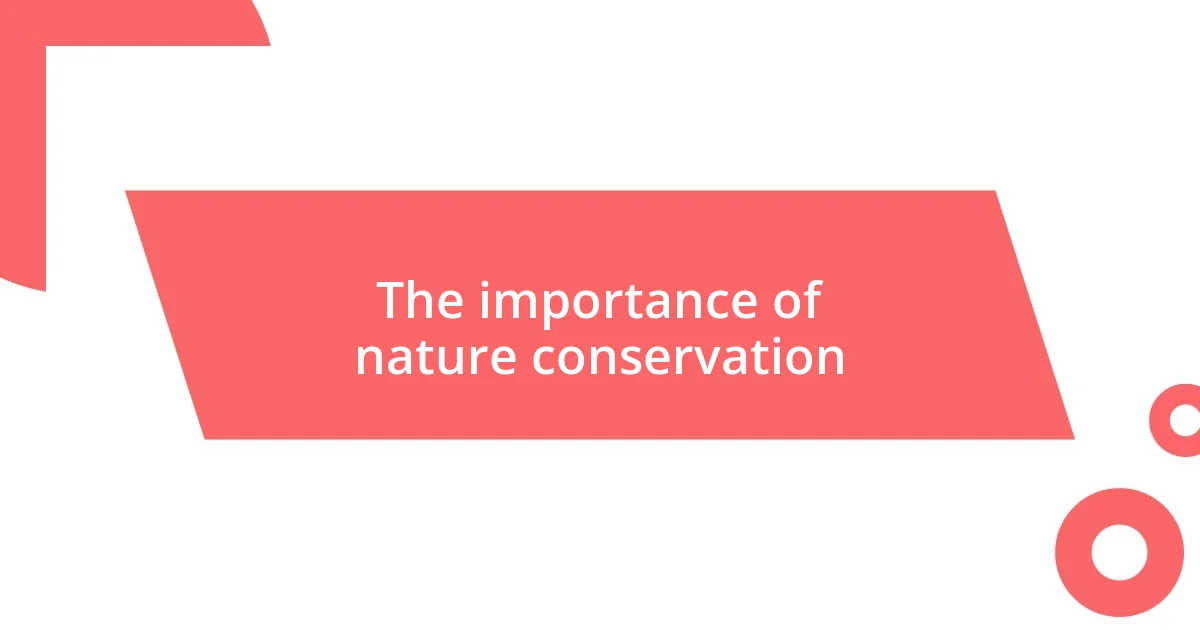
The importance of nature conservation
Nature conservation is vital not only for preserving biodiversity but also for ensuring our own survival. I often reflect on hiking in a lush forest, the sound of rustling leaves lighting up my spirit. It’s a poignant reminder that every ecosystem plays a crucial role in our planet’s delicate balance. Why should we care about the diminishing habitats of wildlife? Because every creature, no matter how small, contributes to the web of life that sustains us.
I remember visiting a beautiful coral reef during a snorkeling trip, marveling at the vibrant colors and bustling marine life. It struck me hard to learn that these underwater wonders are vanishing at an alarming rate. How can we stand by and watch as such breathtaking ecosystems fade away? Each lost reef not only affects marine wildlife but also the communities that rely on them for food and economic stability. Protecting nature isn’t just an environmental issue; it’s a matter of social responsibility.
Our mental well-being is closely tied to the natural environment. Studies show that spending time outdoors can significantly reduce stress and improve mood. I personally can attest to this; a simple walk in my local park has a remarkable power to clear my mind and uplift my heart. So, isn’t it clear that conserving these spaces is essential not only for the environment but for our overall happiness? Each act of conservation leads us to a healthier planet and a healthier society.
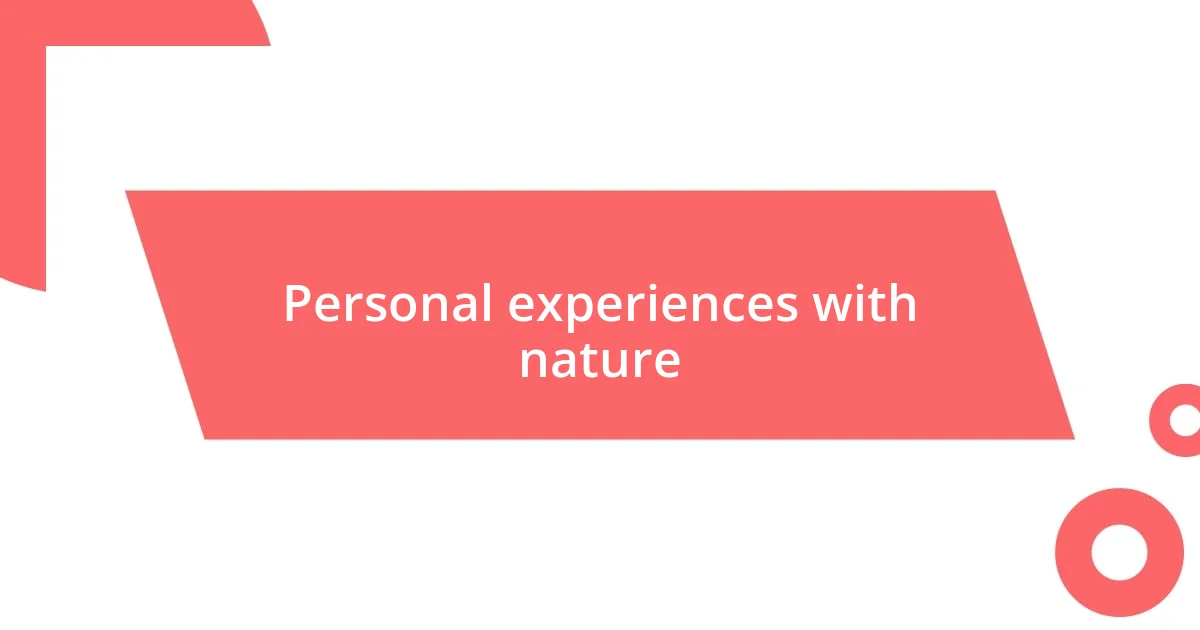
Personal experiences with nature
I can vividly recall one summer afternoon spent by a tranquil lake. The sun shimmered on the water as I leaned against a tree, feeling a sense of peace wash over me. Each ripple on the surface reminded me of how interconnected our lives are with the natural world. It was in that quiet moment that I realized how precious these serene places are and how important it is to protect them for future generations.
Another profound experience occurred during a camping trip in the mountains. As night fell, I was captivated by the vastness of the starry sky. Each twinkle seemed to echo the voices of those who once roamed these lands before us. It filled me with a sense of belonging and responsibility. How could I not do my part to safeguard this beauty against the threats of pollution and climate change? Being surrounded by nature not only ignited my sense of wonder but also sparked an urgent desire to act.
And then, there was the time I volunteered at a local tree-planting event. I will never forget the joy of digging my hands into the earth, planting young saplings that would one day grow tall and strong. The camaraderie among volunteers was contagious, and it felt amazing to contribute to something bigger than myself. Each tree represents hope, and I felt a surge of fulfillment knowing I was helping to create a greener future. It reinforced my belief that personal actions, no matter how small, can create ripples of change in the world.
| Experience | Emotional Impact |
|---|---|
| Afternoon by the lake | Sense of peace and interconnectedness |
| Camping trip in the mountains | Feeling of belonging and responsibility |
| Tree-planting event | Joy of contribution and hope for the future |
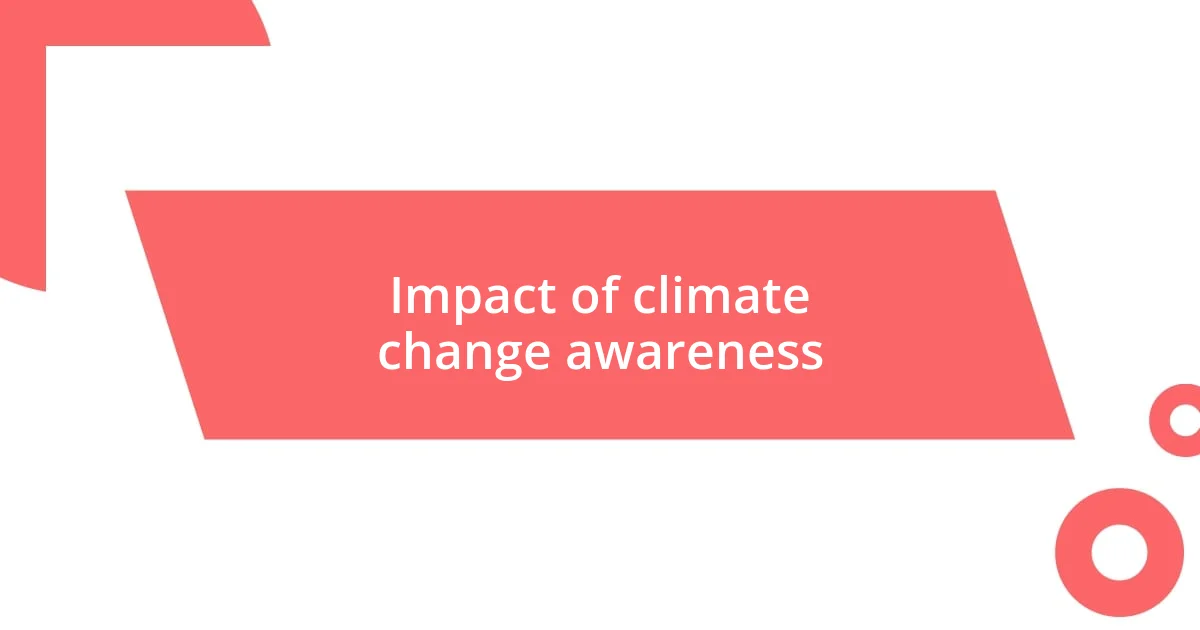
Impact of climate change awareness
I’ve noticed a significant shift in people’s attitudes toward climate change over the past few years. The more aware we become, the more action-oriented we tend to be. For instance, after attending a few local environmental workshops, I was inspired to reduce my plastic use. It was eye-opening to see how individual choices can collectively lead to monumental changes.
- Increased awareness prompts people to adopt sustainable practices.
- Communities become more engaged in local conservation efforts.
- There’s a heightened sense of urgency that pushes for policy changes.
When I look back on conversations I’ve had with friends about climate change, I can feel a growing passion in their voices. Just last month, a friend and I discussed our goal of creating a native plant garden to support local biodiversity. It made me realize how impactful awareness can be—suddenly, we’re not just passive observers; we’re part of a movement that values the Earth and strives for its preservation. Engaging in these discussions fuels my motivation to protect nature, reminding me that awareness is a stepping stone to meaningful action.
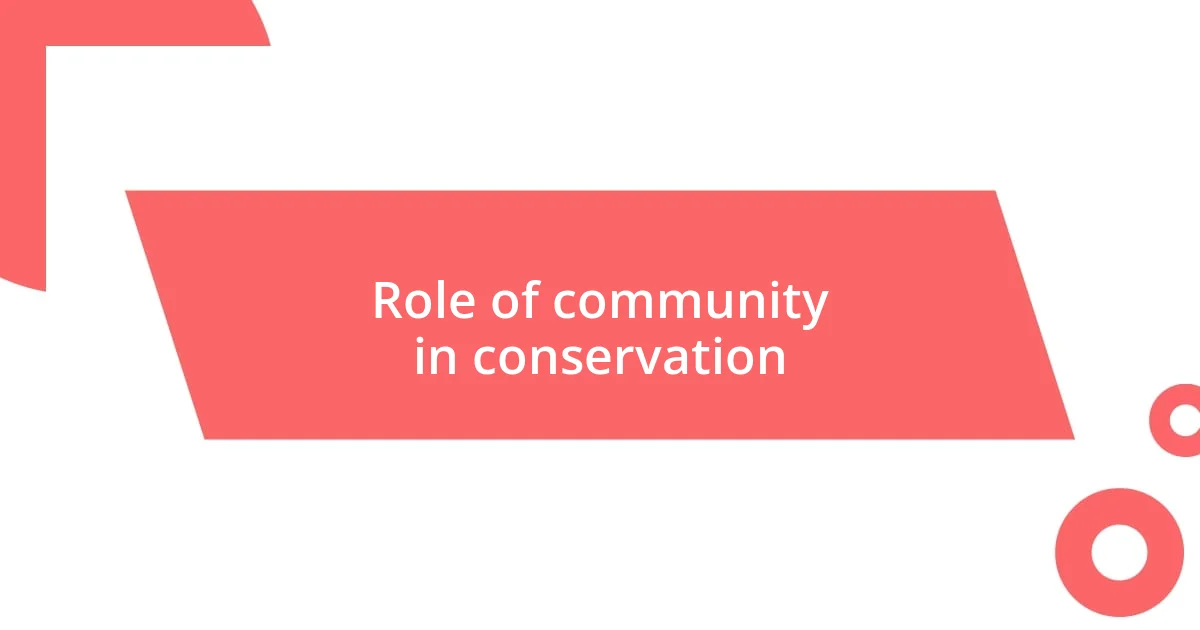
Role of community in conservation
It’s fascinating to see how communities can become the heartbeat of conservation efforts. I remember attending a neighborhood clean-up where everyone brought their families, turning what could have been a mundane task into a lively gathering. The laughter and teamwork made the heavy work feel light, and the sense of shared purpose was palpable. When we all came together, I realized that each person’s commitment—whether big or small—adds up to make a genuine impact on our surroundings.
I often think about how local knowledge shapes conservation strategies. Take for instance a small town near a river where many families had lived for generations. They knew each bend of the river and the seasonal changes it underwent. When it came time to protect their water source from industrial waste, it was these residents who crafted the most effective advocacy plans. Their deep-rooted connection to the land made a compelling case. Isn’t it incredible how people who are connected to their environment have insights that can profoundly influence broader conservation policies?
Even the simple act of participating in community gardens can yield remarkable benefits. I recall my first visit to a shared garden where neighbors came together not just to grow food but also to foster relationships. Watching kids plant seeds alongside elders was heartwarming. The joy in their interactions truly illustrated how conservation is about more than just protecting nature; it’s about cultivating a sense of belonging among people. Have you ever considered how such spaces can nurture a collective identity grounded in stewardship? For me, these shared experiences create a powerful momentum that inspires proactive change in our communities.
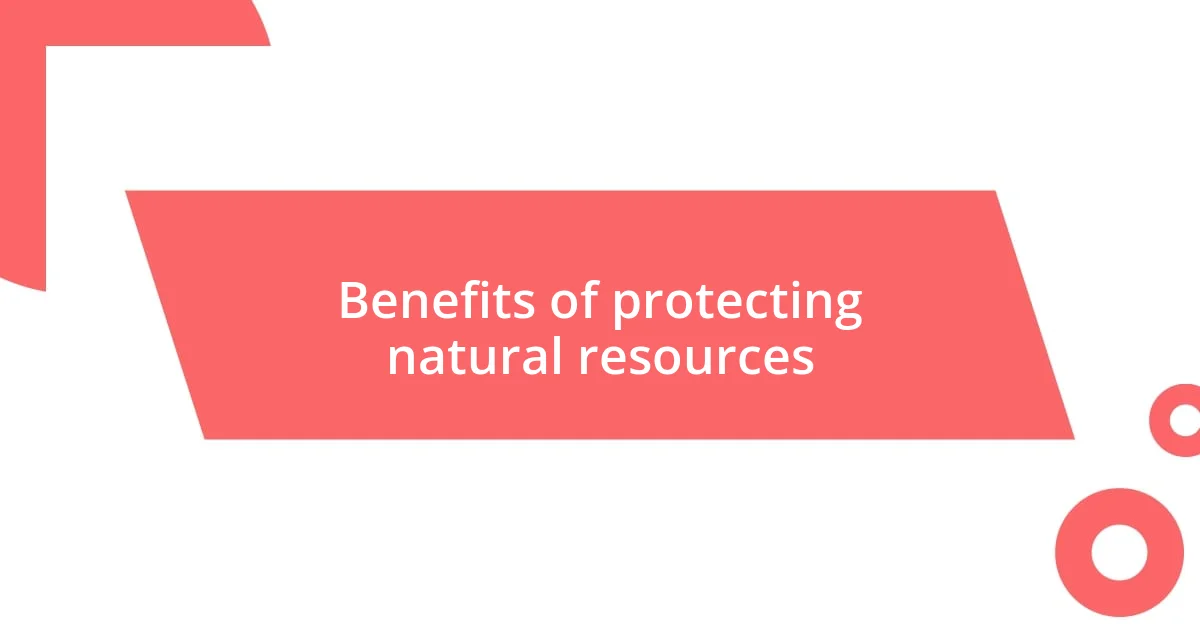
Benefits of protecting natural resources
When I think about the benefits of protecting natural resources, the immediate impact on our health springs to mind. I vividly remember a hike through a forest where the air felt different—crisp, invigorating, and filled with the sound of rustling leaves. Being immersed in nature reminded me that clean air and water are not just natural gifts but essential elements that directly influence our wellbeing. Have you ever noticed how nature can lift your mood or clear your mind? That connection is invaluable.
Another benefit I often reflect on is the economic opportunity that comes from preserving our ecosystems. For example, I once worked with a local group that focused on promoting eco-tourism in a nearby coastal area. It was inspiring to see how protecting pristine beaches and marine life not only revitalized the environment but also created jobs and businesses that relied on a healthy ecosystem. Isn’t it fascinating how stewardship of nature can foster economic growth while safeguarding the planet?
Additionally, protecting natural resources cultivates biodiversity, which is vital for ecosystem stability. I learned this during a community workshop where experts shared the intricate relationships among various species. The example of bees thriving in a well-preserved garden struck a chord with me. They are not just essential for pollinating plants but also contribute significantly to our food supply. As I absorbed this information, it struck me: our actions today directly shape the world of tomorrow. How can we ignore the interconnectedness of all living things? This understanding fuels my passion for advocating sustainable practices.
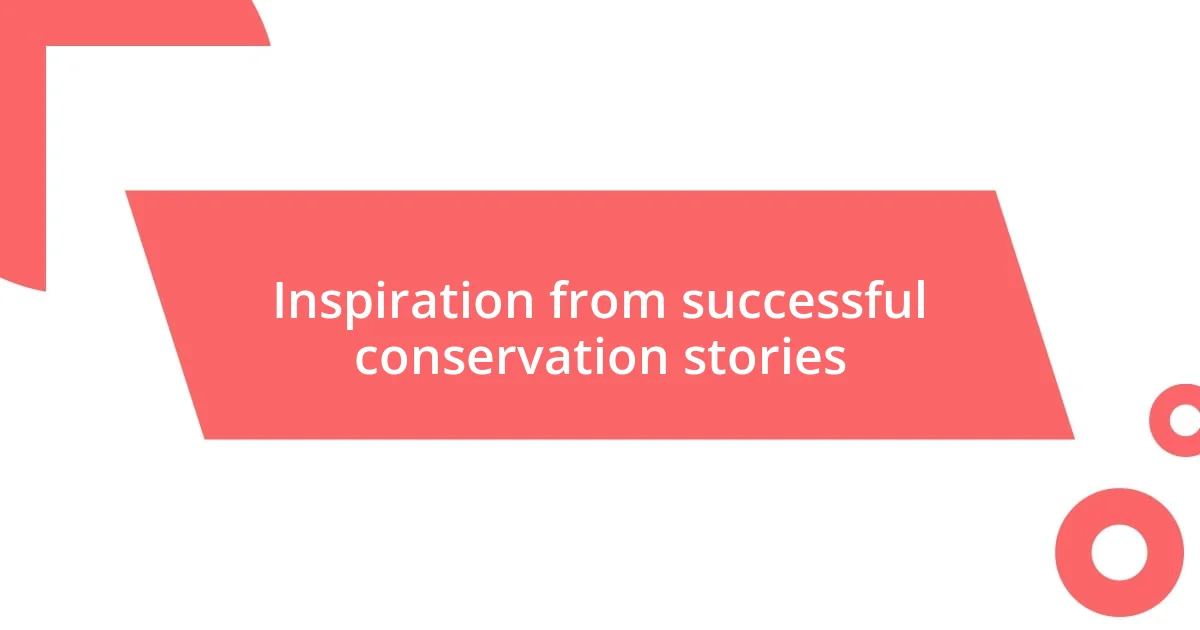
Inspiration from successful conservation stories
One of the most uplifting conservation stories I’ve encountered was in a coastal village in my region. Residents took it upon themselves to restore their local coral reefs after witnessing the devastating effects of climate change. They organized snorkeling sessions where volunteers helped replant coral fragments. I still remember the beaming smiles on people’s faces when they saw the tiny coral pieces thriving. It struck me how a collective effort could breathe life back into the ocean—just imagine being part of a project that literally revitalizes an ecosystem!
Another inspiring conservation success that has stuck with me is the reintroduction of wolves in Yellowstone National Park. Initially, I was skeptical about the impact, but the results were astonishing. The return of wolves led to a more balanced ecosystem, demonstrating nature’s ability to self-correct with a little help. This restoration also brought tourists flocking to the park, encouraging local businesses. Have you ever seen how one decision can set off a ripple effect? It serves as a powerful reminder of how our choices in conservation can lead to profound, far-reaching benefits.
Then there’s the tale of a small community that banded together to protect their local forest from logging. They initiated creative awareness campaigns, transforming their efforts into art displays and educational events. I watched as their passion captivated not just locals but also distant advocates. The awe in their eyes when they secured the forest’s protection was pure joy—it’s contagious when people unite for a cause they care deeply about. It beckons the question: when do we allow ourselves to advocate for what we love? That perfect blend of love for the land along with community spirit reinforces my own resolve to protect nature.










